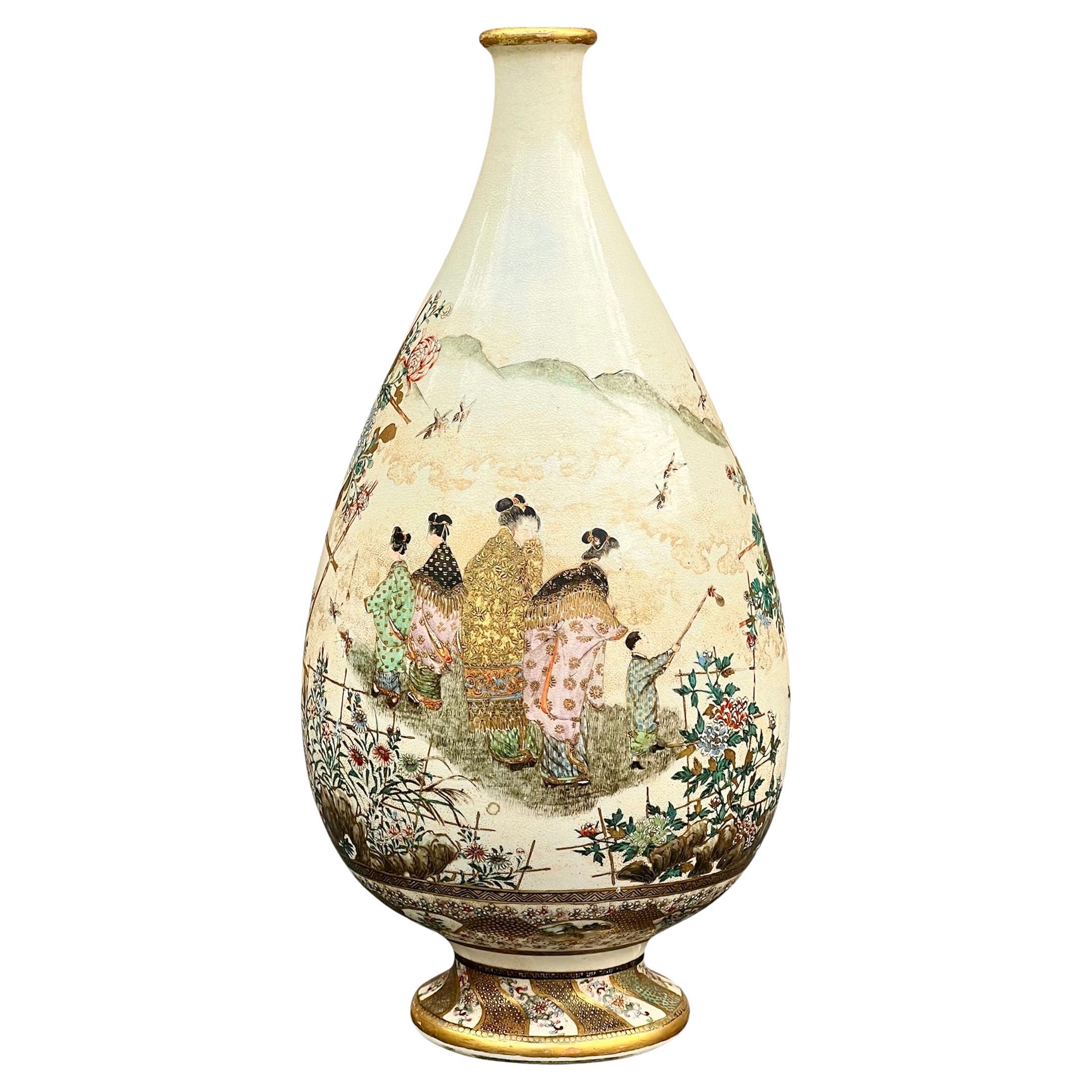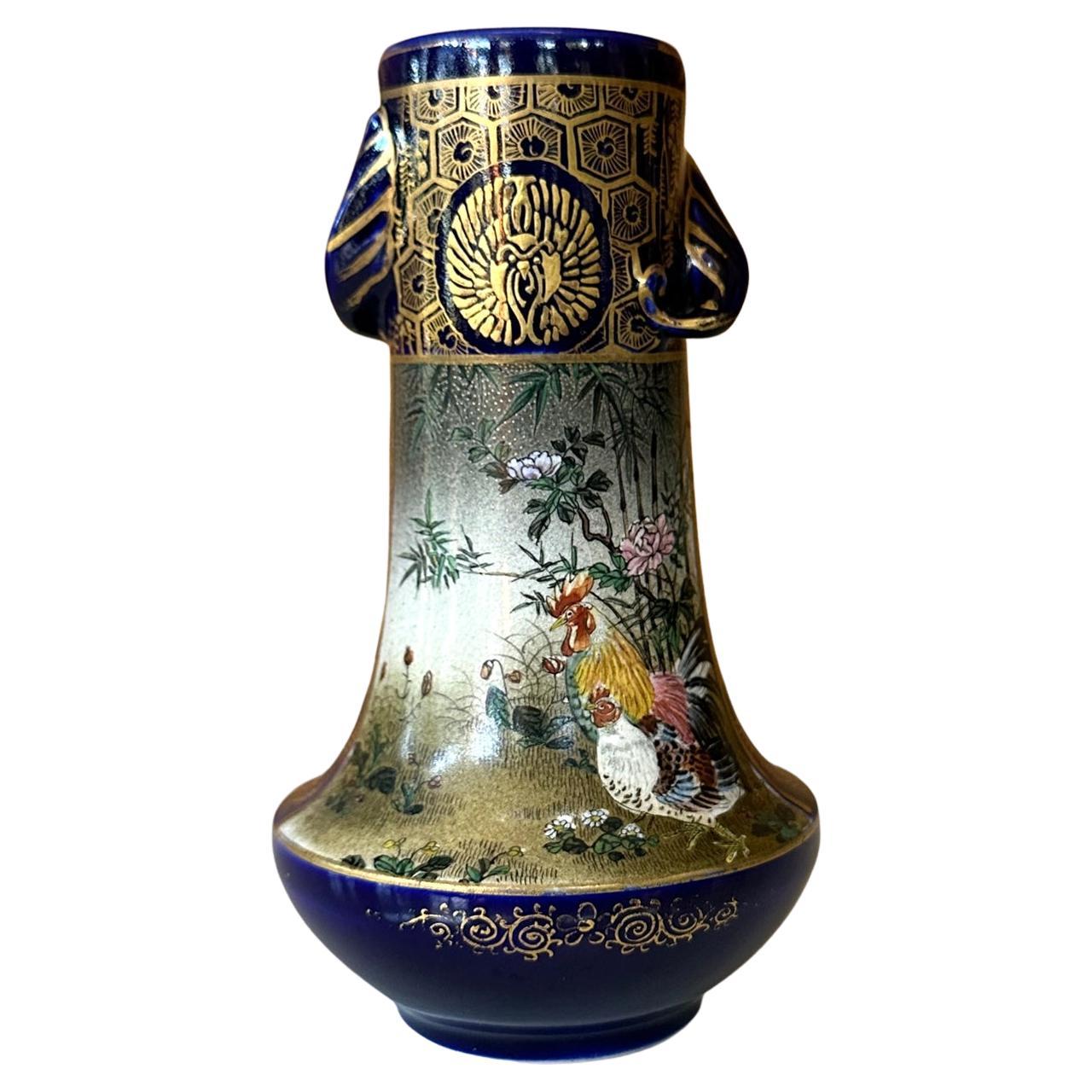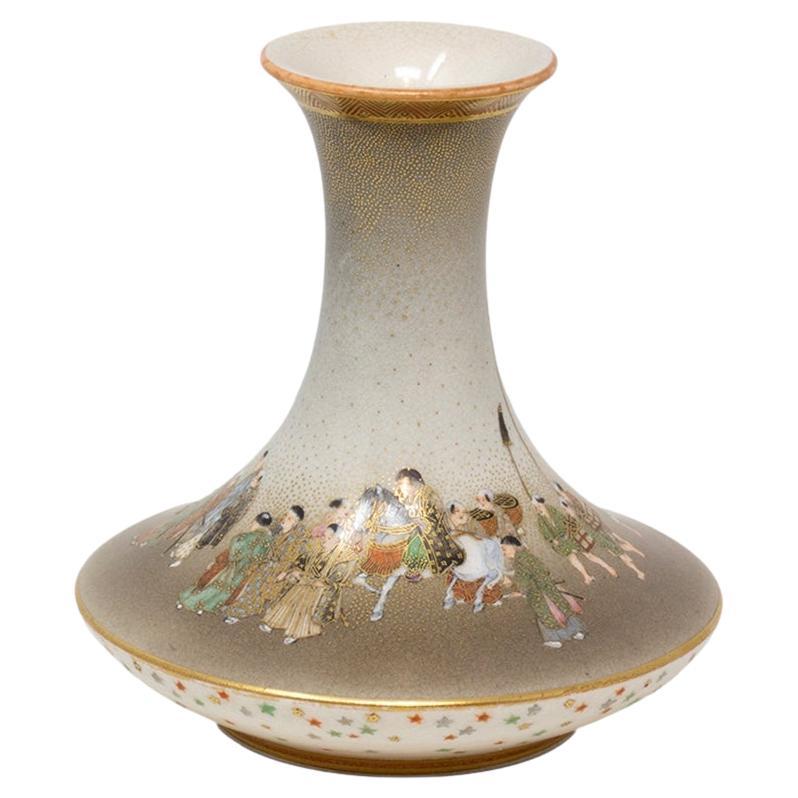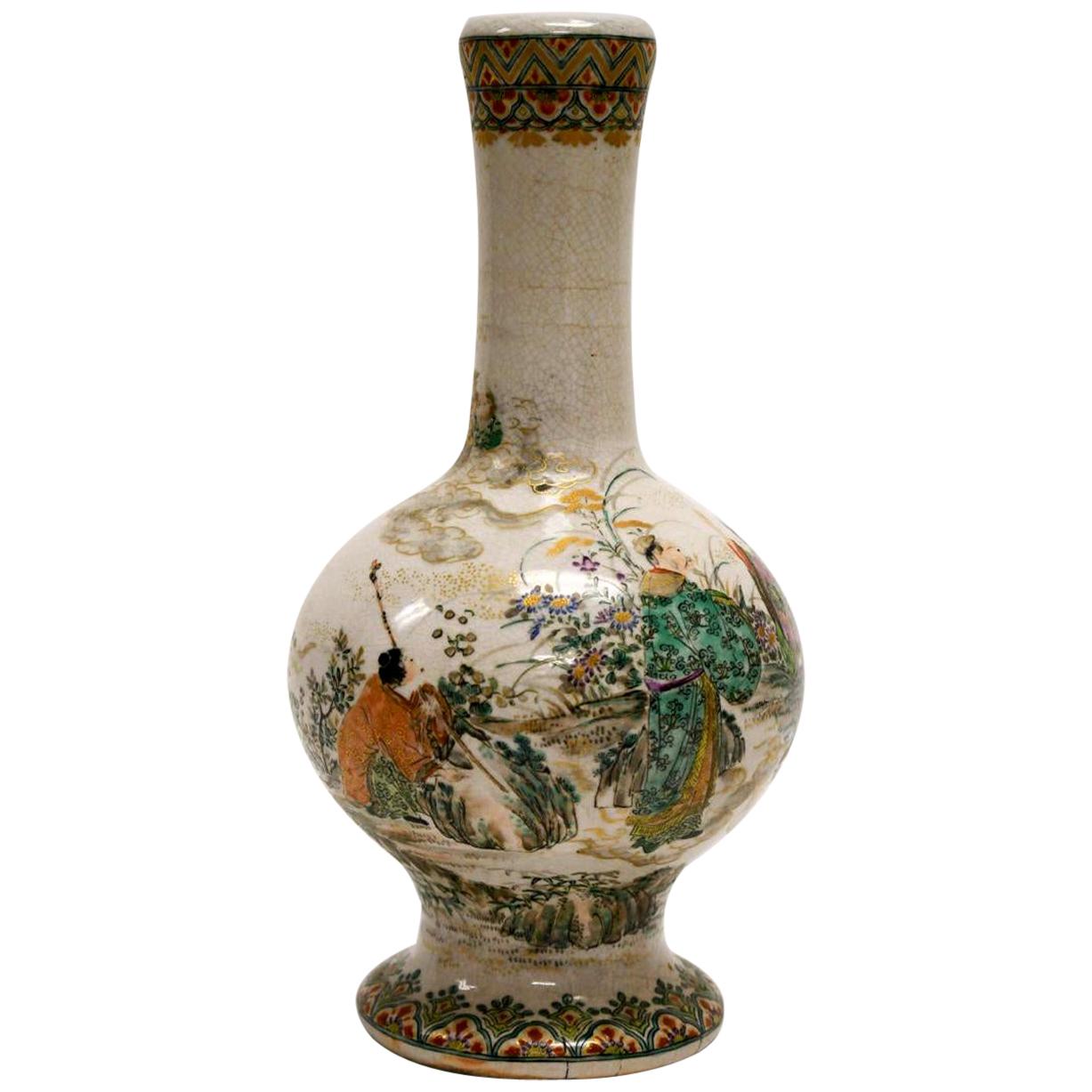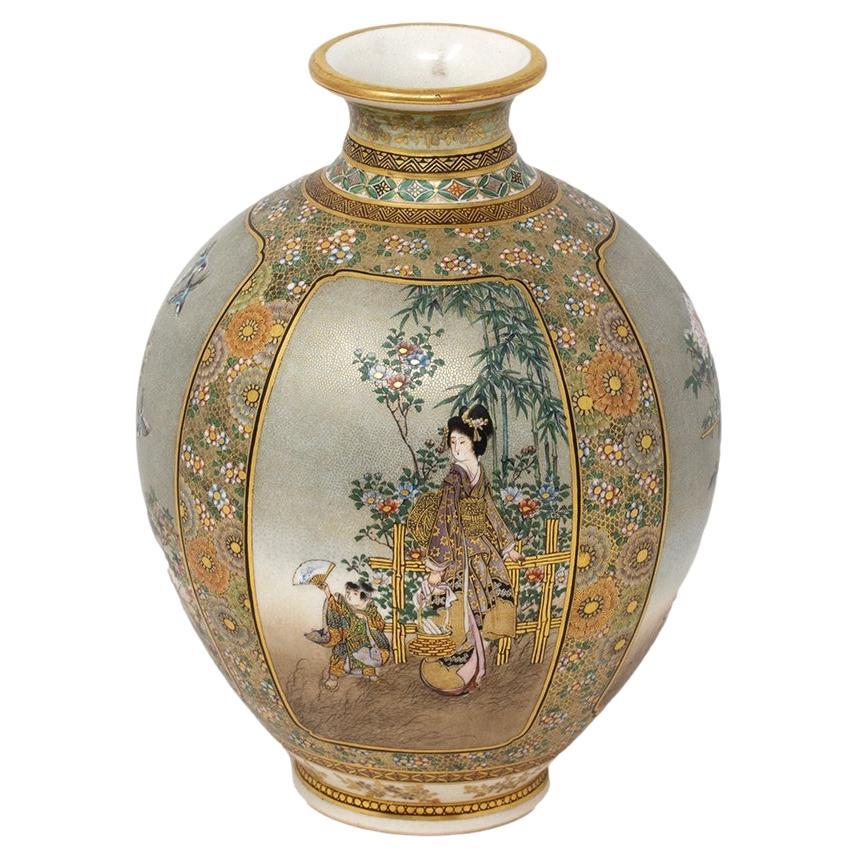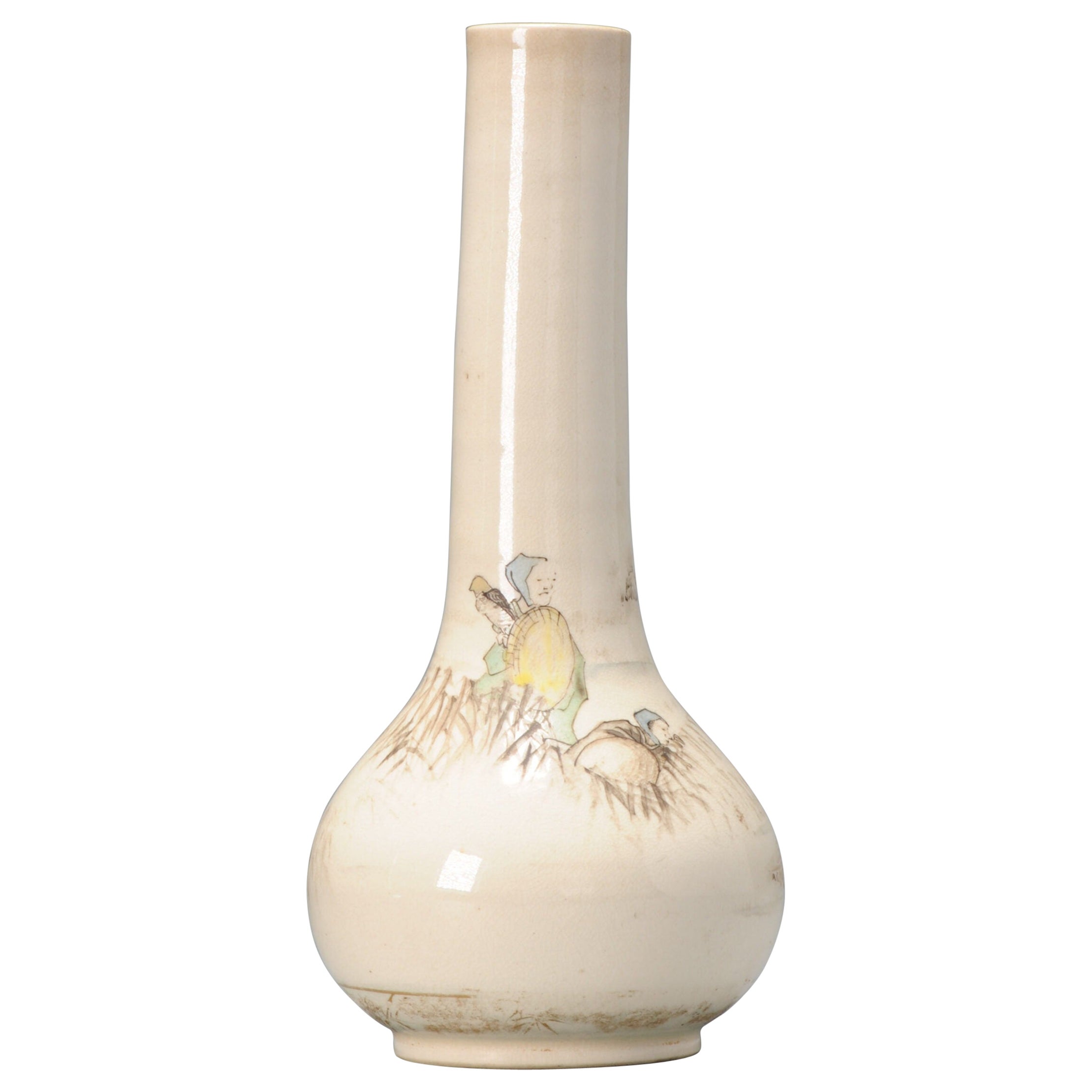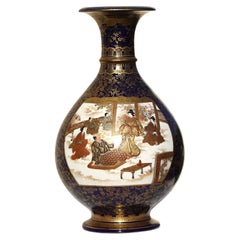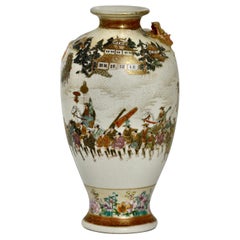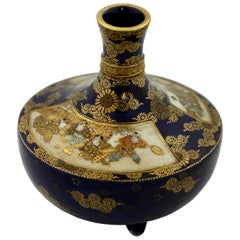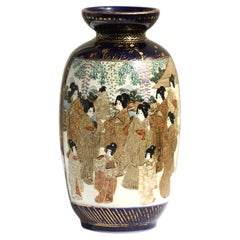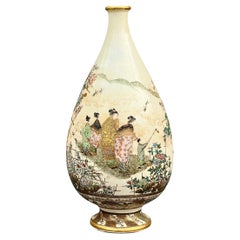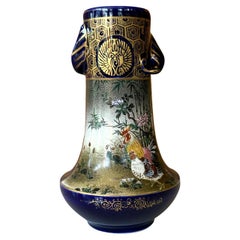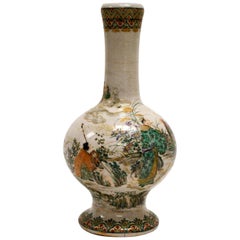Items Similar to Kinkozan, Japanese Satsuma Vase, Meiji Period
Want more images or videos?
Request additional images or videos from the seller
1 of 5
Kinkozan, Japanese Satsuma Vase, Meiji Period
$4,800
£3,669.86
€4,226.93
CA$6,726.27
A$7,509.25
CHF 3,934.73
MX$91,920.59
NOK 49,971.16
SEK 47,116.46
DKK 31,546.03
About the Item
Kinkozan, Japanese Satsuma vase,
Meiji Period (1868-1912)
Of baluster form with an elongated neck decorated in polychrome enamels and gilt on a clear crackle glaze in an Art-Nouveau style of flowers and vines;
Signed Kinkozan with an impressed mark.
Measures: Height 15 in. (38.1 cm.), diameter 4 3/4 in. (12.1 cm.)
- Creator:Kinkozan (Artist)
- Dimensions:Height: 15 in (38.1 cm)Diameter: 4.75 in (12.07 cm)
- Materials and Techniques:
- Period:
- Date of Manufacture:circa 1868-1912
- Condition:
- Seller Location:West Palm Beach, FL
- Reference Number:Seller: 73--0326201stDibs: LU3860118503942
About the Seller
5.0
Vetted Professional Seller
Every seller passes strict standards for authenticity and reliability
Established in 1989
1stDibs seller since 2018
114 sales on 1stDibs
Typical response time: 10 hours
- ShippingRetrieving quote...Shipping from: West Palm Beach , FL
- Return Policy
Authenticity Guarantee
In the unlikely event there’s an issue with an item’s authenticity, contact us within 1 year for a full refund. DetailsMoney-Back Guarantee
If your item is not as described, is damaged in transit, or does not arrive, contact us within 7 days for a full refund. Details24-Hour Cancellation
You have a 24-hour grace period in which to reconsider your purchase, with no questions asked.Vetted Professional Sellers
Our world-class sellers must adhere to strict standards for service and quality, maintaining the integrity of our listings.Price-Match Guarantee
If you find that a seller listed the same item for a lower price elsewhere, we’ll match it.Trusted Global Delivery
Our best-in-class carrier network provides specialized shipping options worldwide, including custom delivery.More From This Seller
View AllJapanese Satsuma Earthenware Vase by Kinkozan, Meiji Period
By Kinkozan
Located in West Palm Beach, FL
A Japanese Satsuma Earthenware Vase by Kinkozan, Meiji period (1868-1912)
The body inset with two panels, one depicting figures seated around a table, the other painted with a joyful scene in a shrine, all reserved on a blue ground decorated with a gilt flower pattern, signed Nihon Kyoto Kinkozan zo...
Category
20th Century Antiquities
Materials
Ceramic
Japanese Satsuma Earthenware Vase, Meiji Period
Located in West Palm Beach, FL
Japanese Satsuma Earthenware Vase, Meiji Period, 1868-1912, of baluster form, the decorated in poly-chrome enamels and gilt on a clear crackle glaze with a Daimyo procession, the nec...
Category
20th Century Ceramics
Materials
Ceramic
Satsuma Earthenware Vase, by Kinkozan
By Satsuma
Located in West Palm Beach, FL
A Satsuma earthenware vase,
by Kinkozan,
Japanese, Meiji period (1868-1912)
decorated in polychrome enamels and gilt over a clear, crackled glaz...
Category
Antique Early 1900s Vases
Materials
Earthenware
Satsuma earthenware vase
Located in West Palm Beach, FL
Satsuma earthenware vase
the baluster-shaped body painted in enamels and gilt with two panels, one depicting numerous immortals with raised gilt in terraced garden setting, the othe...
Category
20th Century Antiquities
Materials
Ceramic
$1,250
Satsuma earthenware cabinet vase
Located in West Palm Beach, FL
Satsuma earthenware cabinet vase, early 20th century, decorated with ladies and immortals, the long neck flanked by elephant handles, signed.
Height 4.62 in. (11.74 cm.), by 3 in. (...
Category
20th Century Ceramics
Materials
Ceramic
Large Japanese Imari Vase
By Imari Porcelain
Located in West Palm Beach, FL
A large Japanese Imari vase
Of baluster form with a long narrow neck enameled in underglaze blue and iron red with catfish and flowers; signed.
M...
Category
20th Century Antiquities
Materials
Ceramic
You May Also Like
A Fine Japanese Satsuma Vase . Meiji Period. Kinkozan
Located in London, GB
A Fine Japanese Satsuma Vase with Bijin, Peacock, and Chrysanthemums.
Attributed to Kinkozan Workshop, Kyoto, Meiji period (late 19th century)
Of pear-shaped form with a flared f...
Category
Antique 19th Century Japanese Ceramics
Materials
Ceramic, Porcelain
Fine Japanese Ceramic Satsuma Vase by Kinkozan
By Kinkozan
Located in Atlanta, GA
A miniature Japanese ceramic vase from the end of Meiji period circa 1880s- 1910s by Kinkozan (1645-1927). One of the largest studio manufacturers of the export ceramics at the time ...
Category
Early 20th Century Japanese Meiji Ceramics
Materials
Ceramic
Japanese Meiji Period (1868-1912) Satsuma Vase by Kinkozan
By Kinkozan
Located in Newark, England
JAPANESE SATSUMA PROCESSIONAL VASE
From our Japanese collection, we are delighted to introduce to the market this Japanese Satsuma Vase by Kinkozan. The vase with a compressed body ...
Category
Antique Late 19th Century Japanese Meiji Ceramics
Materials
Ceramic, Earthenware, Pottery
Early Japanese Satsuma Antique Vase
By Satsuma
Located in Atlanta, GA
An Satsuma ceramic stone ware vase, circa 19th century, around the end of the Edo and the beginning of Meiji period. In the form of a Classic garlic bottle whose prototype was from China, the white bodied piece is decorated with an early form of kin nishikide, the so called golden brocade, a palette of iron-red, blue, green, yellow, purple and black with golden highlight. The over glazed enamel paint shows a group of robed figures in a garden setting with a lion and three tigers. A transparent overall glaze shows very fine crackles. The design is relatively sparse with plenty of negative space in contrast to the Satsuma production from the late 19th century, when the trend became fussy and overly glitz, due to the influence by the perceived western taste for the export market. This piece may still be made for export but its pattern was more influenced by both Kyoto Pottery and the Kano school of painting compared to the export ware by the end of the 19th century onward to the early 20th century. It was believed by many that this was a result of Satsuma potters visiting Kyoto in the late seventeenth century to learn over glaze painting techniques.
There are some age glaze crackles especially around the foot. The piece is not signed in keeping with the earlier production before Satsuma ceramics...
Category
Antique Mid-19th Century Japanese Japonisme Ceramics
Materials
Ceramic
$2,850 Sale Price
25% Off
Antique Japanese Meiji Period (1868-1912) Satsuma Vase by Kinkozan
By Kinkozan
Located in Newark, England
Signed Kinkozan 金光山
From our Japanese collection, we are delighted to offer this Japanese Satsuma Vase by Kinkozan. The vase is potted in globular form with a tightly pinched neck and rolled top rim beautifully decorated with four highly detailed individual panelled scenes. The first a Geisha baring a gilt basket with her child playing with a fan infant of a gilt fence encompassing blossoming foliage and bamboo plants. The second scene depicts two birds, a Red Headed Japanese Wood Pigeon and a white dove in the foreground with a similar gilt fence with blossoming kiku flowers (chrysanthemums). The third scene is painted as a bustling village community with multiple figures going about their daily jobs, a central Palanquins can be seen with two figures carrying a seating figure. To the background a mountainous river landscape can viewed bordering the top left corner. The final scene appears similar to the opposing one with birds swooping high above a polychrome Japanese...
Category
Antique Late 19th Century Japanese Meiji Vases
Materials
Ceramic, Earthenware, Pottery
Antique Meiji Period Japanese Satsuma Vase Yokohama Mark of Hikojiro Imura
Located in Amsterdam, Noord Holland
Quality painting work of Hikojiro Imura
Focused on the fact that the painting of ceramics for export that was being done in Tokyo at the start of the Meiji era was flourishing. He t...
Category
Antique 19th Century Japanese Vases
Materials
Porcelain
More Ways To Browse
Meiji Period
Japanese Art Nouveau
Japanese Satsuma
Japanese Satsuma Meiji
Satsuma Meiji
Satsuma Vases
Japanese Satsuma Vases
Satsuma Meiji Period
Meiji Satsuma Vases
20th Century Satsuma Vase
Satsuma Style
Japanese Crackle Vase
Satsuma Flower Vase
Japanese Crackle Glaze Vase
Vintage Japanese Satsuma Vase Vases
Chinese Qing Plates
Arita Imari
Mandarin Furniture
